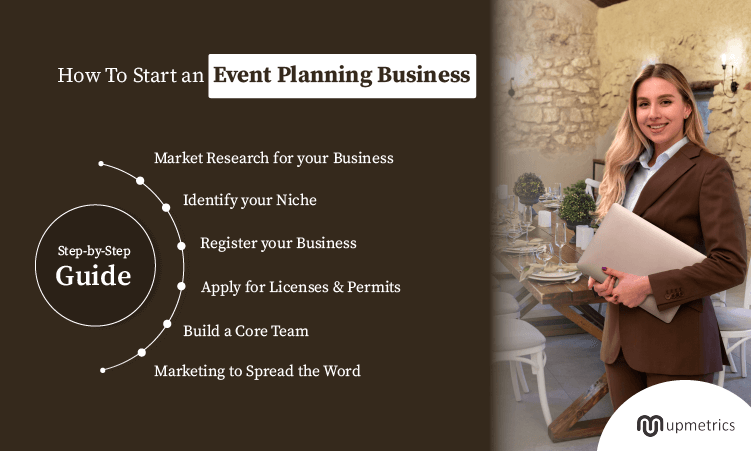The joy of making special days and big events even more special for the attendees seems exciting right? This is what event planners exactly do.
Whether it’s birthday celebrations, weddings, anniversaries, or corporate galas, the demand for expert event planners is soaring.
Starting an event planning business can be a great move because initially it needs a small investment, and you can make good money out of it.
It is a profitable venture but if are you confused about how to start an event planning business, then let us understand it through this guide.
Get to know the basics of event planning
Before you start getting into the process of starting an event planning business, you should know the basics of event planning, like what would be your responsibilities, what kind of events are there, etc.
So let’s get started:
Event Planning is most often used for purposes like
- Social Events: Weddings, birthdays, anniversaries, reunions, etc
- Corporate Events: Seminars, workshops, conferences, product launches, award ceremonies, gala dinners, etc.
- Cultural and Art Events: Art cultural celebrations, exhibitions, music festivals, etc
Key responsibilities of an Event Planner include
- First of all, consult with your client properly before the event to understand their needs, objectives, and preferences.
- You need to build a team as per the event type, whether it is a corporate or social event.
- Prepare a budget to ensure that the event’s overall costs stay within the financial constraints of the customer.
- Choose a venue that aligns with the event’s size, and theme.
- Oversee the various vendors including florists, caterers, and photographers ensuring that they are all synchronized with the timeline.
After having a glimpse of the basics of event planning business, let’s see what is required next to start your business journey.
Quick Steps to Start an Event Planning Business
1. Conduct Industry and Market Research
All businesses have competition – that’s what keeps the market in balance.So it is necessary to conduct thorough research of the market to identify your competitors and the current trends.
Moreover, it also helps you understand your target customers, identify market needs, develop marketing strategies, and maintain a competitive edge.
At the primary stage of your research, you may conduct surveys to learn more about your potential clients and their problems.
Now gather information for the secondary research from online resources and industry reports. Compiling and analyzing this data with your primary research will help you highlight the areas that need attention.
Besides identifying your target market, market research is instrumental in strategic planning for the future of your business. It also helps you discover effective growth strategies by setting the targets for your business and making you aware of your competitors.
2. Identify Your Event Planning Niche
Are you aware that knowing a “niche” is a must in the Event Planning Company? A niche is a segment of the market that an event planner focuses on serving.
Identifying your niche involves determining a specific area or target audience within the broader event industry where you can focus and distinguish your services. This allows you to delve into a specific client base and build a reputation for expertise in that particular niche.
Let’s have a look at a few of the common niches and event types:
Social Events
- Wedding planning
- Baby Showers
- Anniversaries
- Bachelor/Bachelorette Parties
- Birthday Parties
Corporate Events
- Award ceremonies
- Conferences
- Corporate Meetings
- Grand Openings
- Product or Service Launch Party
So you can develop various strategies for your venture after deciding upon any of the following above-mentioned niches as per the demand in the events industry.
3. Prepare an Event Planning Business Plan
Once you know your niche, it’s time to put together your business plan, which is an essential step of any business. A well-structured event planning business plan will help you build a roadmap for your business, by setting out where you want your business to go and how you intend to go there.
This business document will include details about your business, its history, service offerings, management, financial health, and more.
A business plan becomes particularly crucial when one seeks financial support from banks or other institutions. It provides a transparent overview of your plans to attain financial and operational objectives, offering reassurance to funders about the feasibility of loan repayment.
Although, many consider it just a way to peak investors’ interest, a solid business plan can change the entire course of your small business.
Besides these, it also provides a structure for your company’s daily operations, helps you understand the market trend, provides an exit strategy, and also helps to attract key employees.
Not very good at writing? Need help with your plan?
Write your business plan 10X faster with Upmetrics AI
Plans starting from $14/month

4. Consider Startup and Operations Costs
The next foremost step is determining your financing requirements. You must have an in-depth understanding of your startup and operational costs.
You can estimate your startup costs by listing down the essential startup supplies, insurance costs, licensing requirements, office space, and associated expenses.
The operational costs include venue costs, decoration costs, employee salary, marketing, advertising costs, etc.
5. Paperwork and Legal Registration
Setting up the paperwork and legal registration for your event planning company is an important step to ensure that you are committed to legal norms.
First things first – before you start your event planning business finalize the legal structure and do business as (DBA) name of your business.
Brainstorm different names and pick something that reflects your business idea.
You can also opt for the DBA (Doing Business As) name. It allows the business to operate under another name other than the formal business name.
Register your Business Name
Once you have a name decided, it’s time to register your business entity with the state and local government. This will ensure that your business name is yours and you can do the business using that name.
Register your Business Structure
A business structure describes how a company is legally organized. This is an essential part.
You can choose from different business structures like operating as a sole proprietor (if you’ll be running the company on your own), a partnership, as well as other entities that provide limited liability (which ensures you won’t be held responsible for the company’s debts or other actions).
Get an EIN: Federal Tax ID Number
The process for this can vary, so you can reach out to the office of your state’s Secretary for specific guidance. Moreover, obtaining an Employer Identification Number (EIN) from the IRS Internal Revenue System is essential.
Once you have your EIN, you can open a business bank account, apply for a loan, and separate your personal and business finances.
6. Figure Out Pricing Strategy
The pricing structure depends on the market segment you serve, your potential customers, geographic location, expertise, and most importantly your competitor will help you decide your fees.
How you price your event planning services will impact how often you get requests.
You can determine your pricing structure as follows:
Hourly Rate: Initially, some event planners might charge around $25 per hour, while experienced planners can command rates exceeding $100 per hour. Corporate events tend to bring in rates about 30% higher than social events.
Flat Fee: This is a common approach where you charge a fixed price for your event planning services, often including a percentage of the total fees from vendors.
Percentage of Total Event Budget: Some planners prefer charging a percentage of the overall event budget, which could range from 15% to 20%.
Vendor Commission: A few planners choose to decrease their charges or may charge nothing for their services instead they prefer to make their income solely from commissions received from vendors they work with.
7. Get Licenses, Permits, and Insurance
Licensing and legal requirements are important in starting and running your own event planning business.
Common licenses you need to run this business are:
- Business License
- Special Event Permit
- Liquor license
- Fire/fireworks permit
- Health and Safety Permit
- Seller’s Permit
Insurance: While not a permit or license, having general liability insurance, and possibly professional liability insurance, is highly recommended to protect your business from potential liabilities.
8. Build a Core Team
Hiring employees is a crucial step. The team you set up will be the business’s backbone, helping you effectively manage and execute events.
Here are key roles you need to consider when building your core team:
- Event Coordinator
- Accountant
- Marketing and Communication Specialist
- Sales Representative
- Logistics Coordinator
- Administrative Support
You can hire event planners from Zippia, Upwork, Workstream, and also through LinkedIn.
9. Marketing to Spread the Word
You need to build effective marketing strategies to spread the word about your business to attract clients and establish your brand in the competitive world of events. You also need to set some marketing budget.
Here are some key areas to consider:
Target Audience
Who are you trying to reach and cover? Understand their interests, objectives, and event planning needs.
Developing a Strong Brand Identity
First, see what makes your service stand out. Developing a strong USP(Unique Selling Proposition) will help you grow your business by making it recognizable in a competitive market.
Build a professional website
Create a website that is visually appealing, informative, user-friendly, and easy to navigate.
Content Marketing
Be active on social media platforms like Instagram, Facebook, and Pinterest, sharing visually appealing content and engaging with your audience.
Showcase your successful events and satisfied clients to demonstrate your capabilities. Post the reviews of your customers on social media accounts.
Conclusion
Now you might be pretty much clear about how to kick-start an Event Planning Business.
To launch successfully, it’s essential to have a deep understanding of your target market, a solid business plan, and a clear grasp of the legal structure and financial aspects of running the business.
You’ve got everything now! What are you waiting for? Let’s start your journey as an event planner.
The Quickest Way to turn a Business Idea into a Business Plan
Fill-in-the-blanks, AI-assistance, and automatic financials make it easy.




